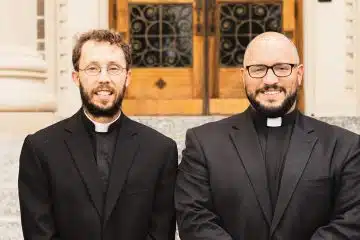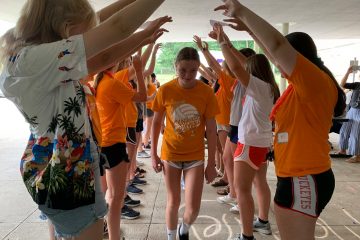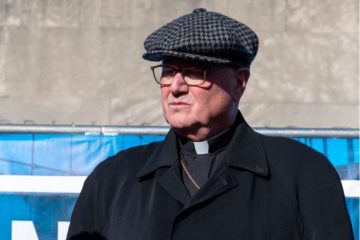Religious educators learn to lead with passion
Friday, April 16, 2010
By Eileen Connelly, OSU
ARCHDIOCESE — The qualities of a competent leader in ministry include a collaborative nature and the ability to be present to others, resolve conflicts, build relationships and balance professionalism with the spirit of the Gospel.
Religious Sister of Charity Edith Prendergast, archdiocesan director of religious education for Los Angeles, discussed these qualities and the challenges those working in parish ministry face in a presentation to members of the Cincinnati Religious Educators Association March 9 at the Kolping Center in Cincinnati. Her talk, titled “Leading with Passion,” marked CREA’s annual March Day, a gathering geared toward spiritual and professional enrichment for area religious educators.
Emphasizing that “all of us are leaders,” Sister Edith encouraged March Day participants to tap into the energy that is already in place in their individual ministry settings, including “connecting the generations to make things happen.”
 |
| Sister Edith Prendergast (Courtesy photo) |
She also asked them to name some of the challenges they currently face in leadership. The responses included the lack of family involvement in parish activities, difficulty recruiting volunteers, engaging various age groups in the life of the parish, changing parish dynamics, economic issues, secularism, consumerism and materialism.
In addressing such challenges, Sister Edith reminded those gathered that “We are not the Messiah. It’s not our call to fix things.”
Our call is to share our power, skills and authority to empower others as Jesus did through His leadership, so they will not only follow but become part of the mission. “That’s what we signed on for,” she said.
Competent leaders are called to be visionary, Sister Edith emphasized, noting that central to that vision is the reign of God. “Our vocation as human beings is to imitate God in being givers of life, sharing our lives, giving away our gifts and our talents. We must be leaders who can ignite, motivate and challenge others to greatness.”
Being visionary means being liberated from calculated plans that promise security, celebrating and learning from our mistakes and recognizing “great things can happen in times of change,” she said.
Attending to their own need for growth, formation and skill development is also critical for competent leaders, Sister Edith noted. In order to “give our gifts in service to others and be able to do a day’s work without excessive worry and in confidence,” those in ministry need to be in relationship with God and others, be able to “spend time and waste time with God,” and “believe in our work, no matter what,” she said.
The ability and willingness to collaborate in ministry is essential too. “Collaboration is not about farming out our duties, but engaging the gifts and talents of others,” Sister Edith said. “It’s empowering and letting go and finding a better way of doing things.”
Being a good listener is a crucial skill for collaborative leaders, as is openness to others and the ability to foster inclusivity. “The goal is to discover ways to identify, release, utilize and unify the gifts of all,” Sister Edith said. “To collaborate really calls for transformation in us, along with realizing that the call is not easy, but in the end we gain much more than we lose.”
Competent leadership also necessitates being grounded in a spirituality “that calls us to be contemplative even in the midst of action,” she said. “We are called to be joyful ministers, delighted bearers of the good news, to have a deeper sense that it’s a privilege to share the faith. We are grasped by the hand of God and called to bring others along with us.”
Those in attendance at March Day found Sister Edith’s presentation to be inspiring and relevant to their ministry.
“She explained that many people see the role of leadership and ministry as getting others to follow you, but that’s not really effective in today’s world,” said Claire Tenhunfeld of the archdiocesan Office of Evangelization and Catechesis. “People expect and need to be included as vital players in what we are calling them to through our evangelization and education efforts. That means our role is not to create followers, but leaders who will enthusiastically contribute their talent and intelligence to help grow the church that Jesus wants us to be in the 21st century. I think that’s a great challenge for us whether we are directors of religious education, pastors, pastoral and youth ministers, catechists or principals.”
Theresa Valerius, coordinator of religious education at St. Peter in Chains Parish in Hamilton, said she appreciated Sister Edith’s reminder that working in parish ministry is “a call to do God’s work and that leadership is not about success, but faithfulness.”
“She affirmed a lot of what I think is good parish ministry and reminded us that sometimes we do take ourselves too seriously and don’t allow the spirit of God to lead us.”
Next year’s March Day presenter will be Bryan Froehle, director of the doctoral program in pastoral theology at St. Thomas University in Miami, Fla.









